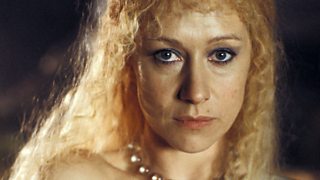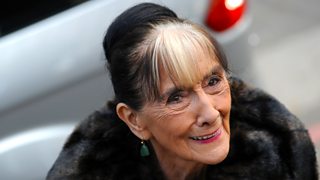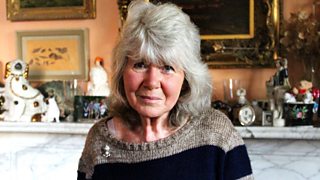Seven things we learned from Danny Dyer’s Desert Island Discs
Actor Danny Dyer became a household name playing Mick Carter, the landlord of The Queen Vic, in EastEnders. His performance won him three National Television Awards.
He began his career as a child actor and clinched his first television role at 14 when he performed alongside Dame Helen Mirren in the drama series Prime Suspect 3. He made his television debut in the film Human Traffic in 1999 and the following year played a waiter in the Harold Pinter play Celebration. He went on to become known for a series of hard man roles, but in 2024 he showed his softer side in Rivals, the television series adapted from the novel by Dame Jilly Cooper.
Here are seven things we learned from Danny Dyer’s Desert Island Discs…
-
![]()
Listen to Danny Dyer's Desert Island Discs
Listen on ÃÛÑ¿´«Ã½ Sounds to hear the episode with full music tracks first.
1. His first audition led to him working with Dame Helen Mirren

Danny’s favourite lesson in school was drama, taught by Miss Flynn. “I found it so easy,” he says. “I couldn’t believe other people couldn’t do it… I just loved it.”
He began going to drama classes after school and got the first part he ever auditioned for at 14, playing an underage sex worker in the television drama series Prime Suspect 3. “I did the audition and nailed it and got the job, then I was physically on a set with David Thewlis and Helen Mirren. I was looking around going, ‘Wow.’” He says, he “never felt intimidated by it. I felt like I belonged there. Even when I’d wrapped, I wanted to stay on set and listen and learn. I remember Helen Mirren saying I was a really good actor. I loved showing off in front of her.”
2. His father was not a man in touch with his emotions
Danny describes his father as a masculine man. “He wasn’t cuddly and I think he did like me, he just never showed it in that way. There was a moment when I wasn’t able to hold his hand any more when we were crossing the road. It was a really busy road and I went to grab his hand and he went, ‘No, we don’t do that anymore boy.’”
Danny says, “I understand why my dad was like that because he was brought up in the fifties and the sixties and his dad was quite a military man. He was quite aggressive my grandad. He used to hit him [Danny’s dad] and if my dad was a minute late coming home, he’d be locked in his bedroom and he wouldn’t get any dinner. I suppose I’ve done the opposite, in the sense that the stuff I didn’t like about the way I was parented, I thought, I’m not going to do that with my kids, I’m going to be the opposite.”
3. His mum inspired one of his music choices
Danny’s parents separated when he was nine and his dad left the family home. Danny says, “I was brought up by very strong matriarchs that swore a lot. My mum, my nan, my aunts. What’s important for a child is love and stability. I had a lot of love. My mum is a very affectionate person and still is.”

He always said to me, ‘Just be you, everyone else is taken.’ I never quite understood what that meant, but I get it now.Danny recalls Harold Pinter's words of advice.
He chooses the track Move Closer by Phyllis Nelson, released in 1984, as a tribute to his mum Christine. “It just reminds me of my youth and watching my strong mother get on with it, bringing up three kids, a pile of ironing next to her, cooking, fag hanging out of her mouth, she doesn’t smoke any more... So I suppose it [the track] reminds me of her and her strength as a matriarch and a beautiful woman.”
4. He liked getting a laugh when he was a child
“I think I was a naughty kid in the sense of very cheeky… I was quite scatty and a bit weird, just odd. I would do weird voices and dance around… [They] used to call me Spandau [after the band Spandau Ballet] because I was really skinny… and dancing about to that sort of music then I suppose, but the ability as a child to make adults laugh was a power.”
5. The playwright Harold Pinter was a father figure
In 2000, Danny got a part in Harold Pinter’s play Celebration. He didn’t know who Pinter was, but they later bonded and Danny appeared in three of his plays while the playwright was alive. He says, “He [Harold] was my introduction to theatre. I had nothing in common with these people… very middle and upper class people that I was around and I wasn’t very good at the social aspect of it, but he was with me and he put his arm round me and when you’re mates with Pinter everyone loves you.”
Danny describes how Pinter helped him understand the role he played in Celebration. “I’m talking about very famous writers and poets WH Auden and CS Lewis, people I didn’t know. So, I used to stay in his house in Notting Hill and he would buy me a six-pack of lager, and he used to drink his wine, and I’d sleep in his study, he’d put a camp bed out for me, and we’d talk about these people that I didn’t understand and why they were important and what they did. And I felt safe with him and he wanted me to be a theatre animal.”
6. His wife keeps him grounded
Danny met his wife Jo at school when he was 13. He says, “She’s someone that’s really kept me grounded all these years, to be honest, because she’s never really been into the acting side of things. She never really gives me a compliment, which I love. Most people you come across with fame, they’re ‘Yes people’. She came and watched me in a Pinter play once and said, ‘Don’t get carried away with yourself.’ I probably need that in my life. She keeps me very much grounded. She’s the only woman for me, for sure. Nobody knows me better than her. There’s a history there. I love her. I adore her.”
Danny’s final disc is their wedding song – Chris Isaak’s 1989 hit Wicked Game.
7. He is proud of his working class roots
“I’ve been around a long time, over 30 years,” says Danny. “I think I’ve done some really good work over the years, [but] I’ve never really been acknowledged. I think there’s a bit of elitism within our industry… I went through a stage where I was a bit of a parody of myself and I had some awful reviews. I’ve had reviews by certain people, I won’t mention them, that wrote reviews in a cockney accent, cutting out H’s in sentences and ‘strike a light guvnor’ and stuff like that, but I thought ‘why is that allowed?’
He remembers the advice from his friend Harold Pinter. “He always said to me, ‘Just be you, everyone else is taken.’ I never quite understood what that meant, but I get it now.”





